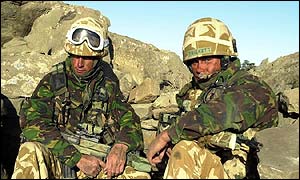| You are in: World: South Asia | |||||||||||||||||||
|
|
Thursday, 18 April, 2002, 10:42 GMT 11:42 UK
Marines dig in for tough mission

The marines have trained hard for the operation
Navigating the rugged mountain terrain of south-east Afghanistan requires the agility of a goat. Five days into their operation to root out pockets of al-Qaeda resistance, the Royal Marines are proving that you don't have to be a four-legged animal to be able to run nimbly along narrow paths. When I flew in by helicopter to see how they were doing, the marines were in good spirits.
But al-Qaeda is not the only enemy - there's also Mother Nature to contend with. The marines are dug in 10,300ft above sea level. The air here is thin, there's less oxygen and breathing is much harder - just moving around requires lots of energy. Freezing temperatures The marines told me they've trained hard for this though, and they're finding the altitude and the rocky landscape easier to navigate than they expected. Sergeant-Major Tony Jacka, of 45 Commando, told me: "The marines are very fit. "We've been training for years in Norway to deal with fighting in high altitudes and freezing temperatures."
We were at the summit of a mountain looking across a valley - just a few miles from Afghanistan's border with Pakistan. It's a staggering view but encompasses some of the most dangerous land in the country. The area is littered with landmines and there's the ever-present threat from al-Qaeda fighters. Intelligence clues Over the past few days, the marines have been scouring the valley and surrounding peaks. Their aim is to stop al-Qaeda and Taleban fighters crossing the area and so far, they seem to have been successful. They've seized bunker after bunker - destroying them after a thorough examination. Some of the caves are quite sophisticated with modern communications equipment and stuffed full of documents. The hope is that they'll provide vital intelligence clues about al-Qaeda's intentions.
Standing in a marine dug-out, I watched as artillery shells slammed into a mountainside, just a few hundred metres away. The target of the marines' 105mm guns was a cluster of al-Qaeda mortar positions. There was evidence that they'd been used recently and the troops want to prevent them being used in future. The commander of 45 Commando, Lieutenant-Colonel Tim Chicken said: "So far, we've had a lot of successes and we've certainly blown-up a lot of al-Qaeda facilities."
But as the leader of the operation he knows there's a long way to go yet. The question on all the marines' lips was "where are all the al-Qaeda fighters?". Until now, 45 Commando haven't seen any. It all confirms suspicions that they're hiding just over the border in Pakistan. Intelligence sources have told me that there may not be more than 200 left in Afghanistan. Military rations The rest are biding their time in Pakistan - avoiding a battle with the marines, possibly regrouping ready to carry out guerrilla operations. One marine, 24-year-old Andrew Robertson said: "It's disappointing that we haven't come face to face with al-Qaeda. It's a long way to come without putting our skills to the test." But all the marines I spoke to know these are early days. As they wait on the mountains, they're aware this won't be the last night they endure in the bitter cold, watching and waiting. They're surviving on military rations - beef stew and a dozen other varieties of meals which they get given in little sachets to heat up. It's a tough existence but they believe it's for a good cause. The operation on this mountain is coming to an end but there'll be plenty more discomfort in the months ahead. This is going to be a long campaign. Stark warning The marines acknowledge there's no room for complacency. Not far from their positions is a reminder of how things can go badly wrong. A burned-out carcass of an American Chinook helicopter lies on the ground. It was shot down by al-Qaeda fighters during Operation Anaconda last month. Most of those on board were killed. It's a stark warning of the need to be alert. The marines are adamant that such a catastrophe won't happen to them, but they admit this is a very unpredictable country.
|
See also:
Internet links:
The BBC is not responsible for the content of external internet sites Top South Asia stories now:
Links to more South Asia stories are at the foot of the page.
|
|||||||||||||||||
|
Links to more South Asia stories
|
|
|
^^ Back to top News Front Page | World | UK | UK Politics | Business | Sci/Tech | Health | Education | Entertainment | Talking Point | In Depth | AudioVideo ---------------------------------------------------------------------------------- To BBC Sport>> | To BBC Weather>> ---------------------------------------------------------------------------------- © MMIII | News Sources | Privacy |
|